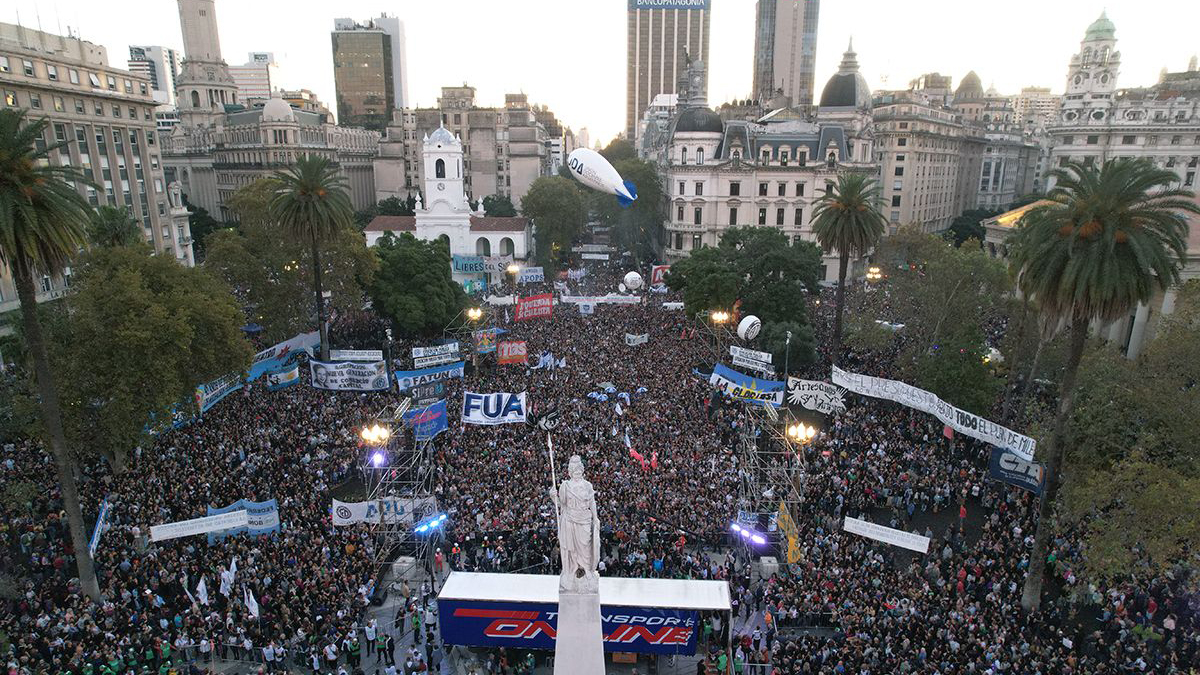“We do not want them to take away our dreams. Our future does not belong to them,” said the president of the Argentine University Federation (FUA), Piera Fernández de Piccolini, to an overflowing Plaza de Mayo during the march in defense of public universities on April 23. The protest organized by student groups and educators unions was also supported by labor unions and left parties.
At the Plaza, hundreds of thousands chanted: “The country is not for sale!”
“Education is a fundamental human right because it reduces inequality,” added Piccolini, who read the closing declaration of the mobilization.
Javier Milei’s government has decided to keep public university funding at the same levels as 2023, despite inflation which has de facto reduced the value of the budget by 80%. Milei has criticized public universities as hotbeds of socialism and indoctrination, stating that “the cognitive dissonance that brainwashing generates in public education is tremendous.”
With Milei freezing the budget for higher education, teachers, non-teachers and students mobilized to make visible the complex situation experienced by higher education institutions nationwide. According to the National Interuniversity Council itself, the budget is not enough to cover expenses beyond the middle of the year and some faculties have started to reduce enrollment, cut electricity, and even limited the use of elevators for people with reduced mobility.
Public universities are already in crisis in Argentina. Stefan, one of the 2.5 million public university students, spoke to Tiempo Argentino, “We study in the dark. There is no money for reagents, the laboratories are out of materials. They have the logic of business. Education is not a business.”
“Education is a fundamental human right because it reduces inequality,” the document read at the march said. “Students work and take care of their families. Scholarships are fundamental. Progresar and Manuel Belgrano scholarships suffered cuts. Universities lack the budget to support their own scholarships. A country that does not invest in education renounces its sovereignty.”
“The public university is going through a critical moment. We are grateful for the support of society as a whole. Public universities support democracy, production and social ties. The budget of the universities was frozen. The one we have is at 2022 values. The government’s announcements were absolutely insufficient,” remarked the president of FUA, reading the document.
Before De Piccolini closed the act, there was a long list of speakers, which included Human Rights leaders, trade unionists and academics. Taty Almeida, of the human rights organization Mothers of Plaza de Mayo, which fights for memory and the truth about the 30,000 detained and disappeared during Argentina’s brutal military dictatorship. Almeida has participated in mass mobilizations against Milei for his blatant denialism of the true number of casualties of the dictatorship.
“We are here to repudiate the decision of President Milei of not wanting to finance public universities and public schools. It is a political march, but not partisan. The president criticizes the unions for marching. Of course they march because union members also send their children to university and public schools,” Almeida said. “We, the crazy ones, tell you that in spite of the canes and wheelchairs we are still standing. Seeing so many young people gives hope. You are the replacement. We have a great militancy on the part of the young and the not so young.”
On April 24, a day after the march, Milei took to Twitter to denounce the participation of unions and the broad coalition in the mobilization. “This is how yesterday we saw the same old faces of those who want Argentina not to change to defend its privileges. Massa, Cristina, Lousteau, Yacobitti, the CGT, the CTA, complicit radicalism, and all the other actors of the political class who oppose any change because they have been the main beneficiaries of the old regime,” he wrote. “They do not defend education. They defend their privileges and use society to do so.”
Apart from being a human rights activist, Taty Almeida is also a struggling teacher. Before going on stage she says, “I come as a Mother, but also as a teacher, because I also fell into public education. We must defend the right to education, which is a human right.”
This article is based on reports from Tiempo Argentino and El Grito del Sur.





